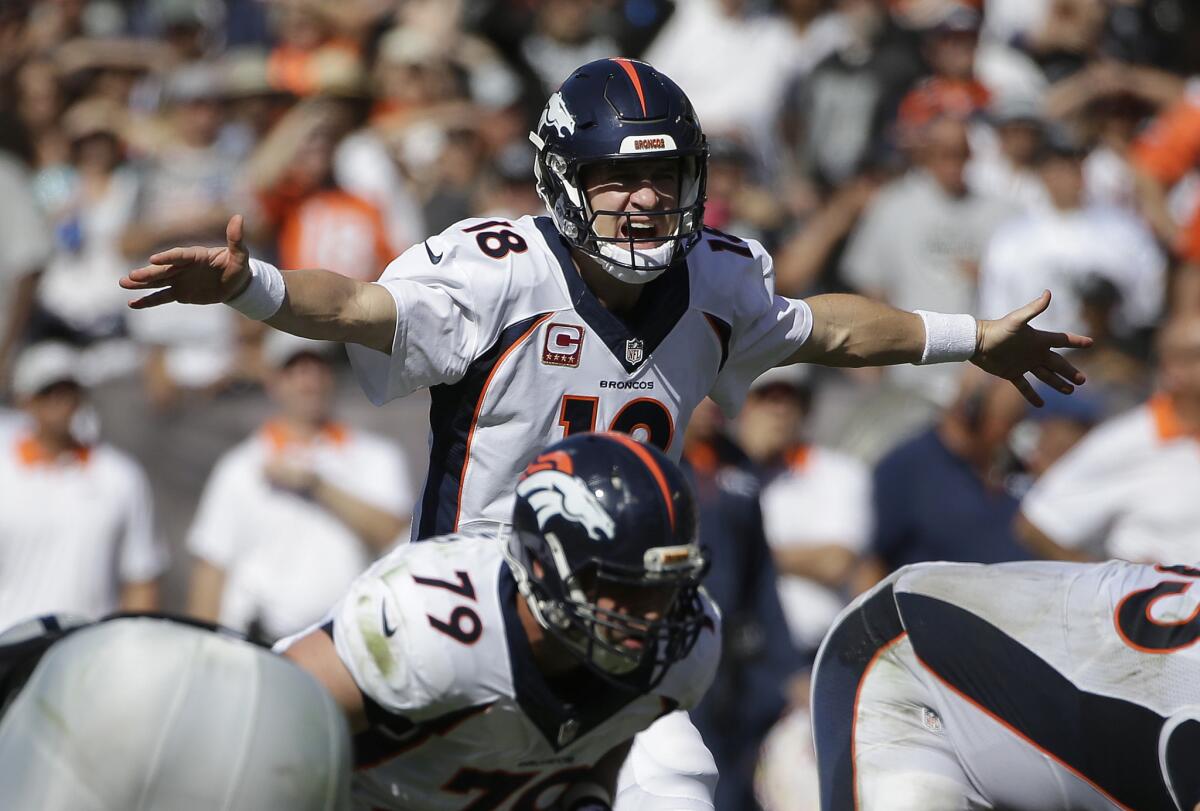Ask Farmer: Why do only two players on the field get headphones in their helmets?

Denver quarterback Peyton Manning gestures during a game against Oakland on Oct. 11.
- Share via
Have a question about the NFL? Ask Times NFL writer Sam Farmer, and he will answer as many as he can online and in the Sunday editions of the newspaper throughout the season. Email questions to: sam.farmer@latimes.com.
Why do only two players on the field have headphones in their helmets? I understand that the headphone shuts off before the play but why wouldn’t just all of the players be able to hear the play call from the coach, especially in these loud stadiums?
Bill Shupper, La Cañada Flintridge
Farmer: Let’s first address why the NFL allowed helmet radios in the first place. Although legendary coach Paul Brown experimented with the devices in the 1950s, it wasn’t until 1994 that the NFL allowed coaches to discuss plays and strategies by using a coach-to-quarterback communication system. It was to discourage the practice of stealing signals, even though that still goes on to some extent. In 2008, the league afforded defenses the same luxury. Two defensive players per team were fitted with helmet radios, although they were not allowed on the field at the same time.
The league doesn’t want to outfit more players with the radios, and likes the fact that stadium noise is part of a home team’s advantage, a hurdle for visitors to overcome. As for the radios cutting off with 15 seconds remaining on the play clock, I asked former UCLA coach Rick Neuheisel, who was Baltimore’s offensive coordinator before taking over at his alma mater, about the rationale for that.
“The NFL doesn’t want the coach to be directing more than a play call,” Neuheisel said. “They don’t want you to be reminding somebody about your technique, reminding somebody that, ‘Hey, this guy’s nursing a hamstring. I can see it from up here.’ They want all that intelligence to be maintained on the field.
“You want the game to stay on the field, rather than the players being marionettes. I don’t think that’s ever going to change. The league’s going to continue to want the unpredictability, and for players who are that much further ahead to have the advantage. The Peyton Mannings and the Tom Bradys who can see everything, they want them to have the advantage. Creates the heroes.”
Why is spiking the ball by the quarterback to stop play not considered intentional grounding?
Gary Emerling, Westlake Village
Farmer: NFL rules say a player under center “is permitted to stop the game clock legally to save time if, immediately upon receiving the snap, he begins a continuous throwing motion and throws the ball directly into the ground.” However, if that player delays that spike for strategic purposes, including dropping back at all, it is intentional grounding, even if he’s under no pressure from pass rushers.
More to Read
Go beyond the scoreboard
Get the latest on L.A.'s teams in the daily Sports Report newsletter.
You may occasionally receive promotional content from the Los Angeles Times.











